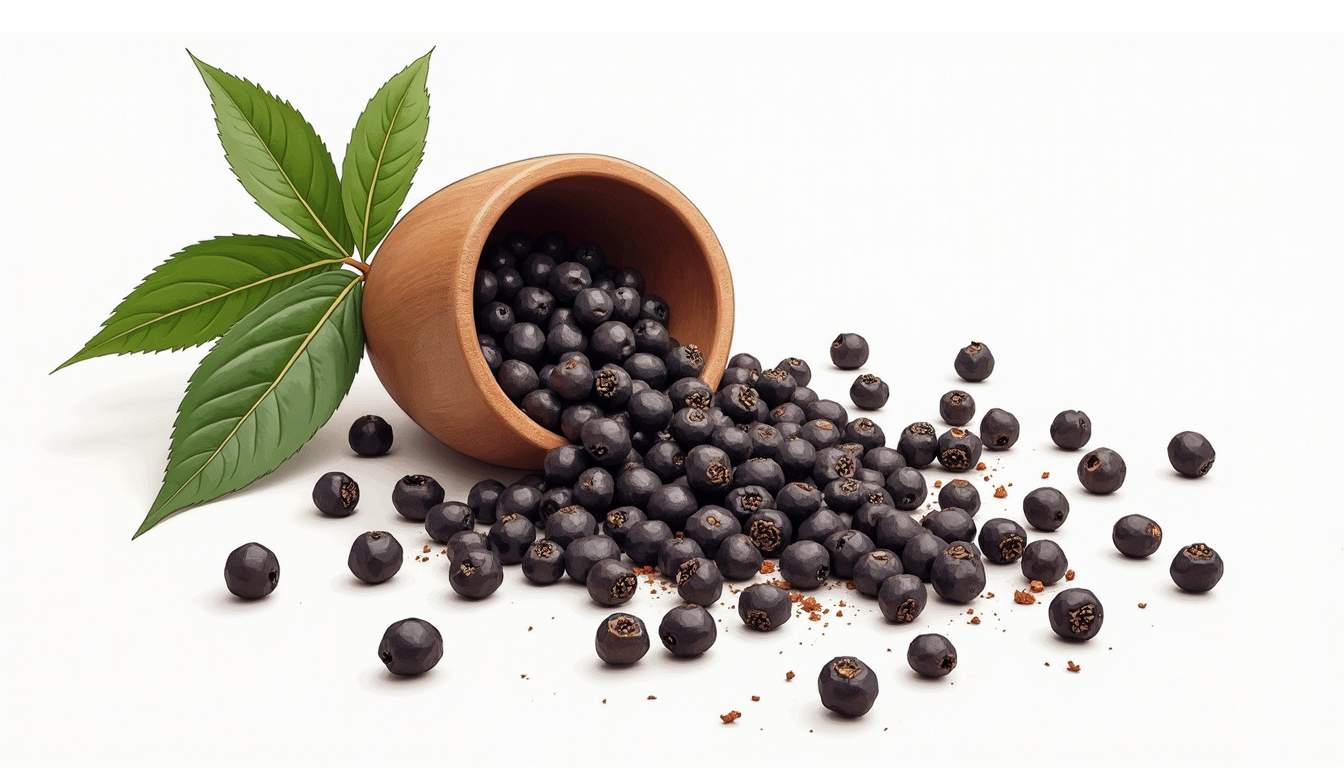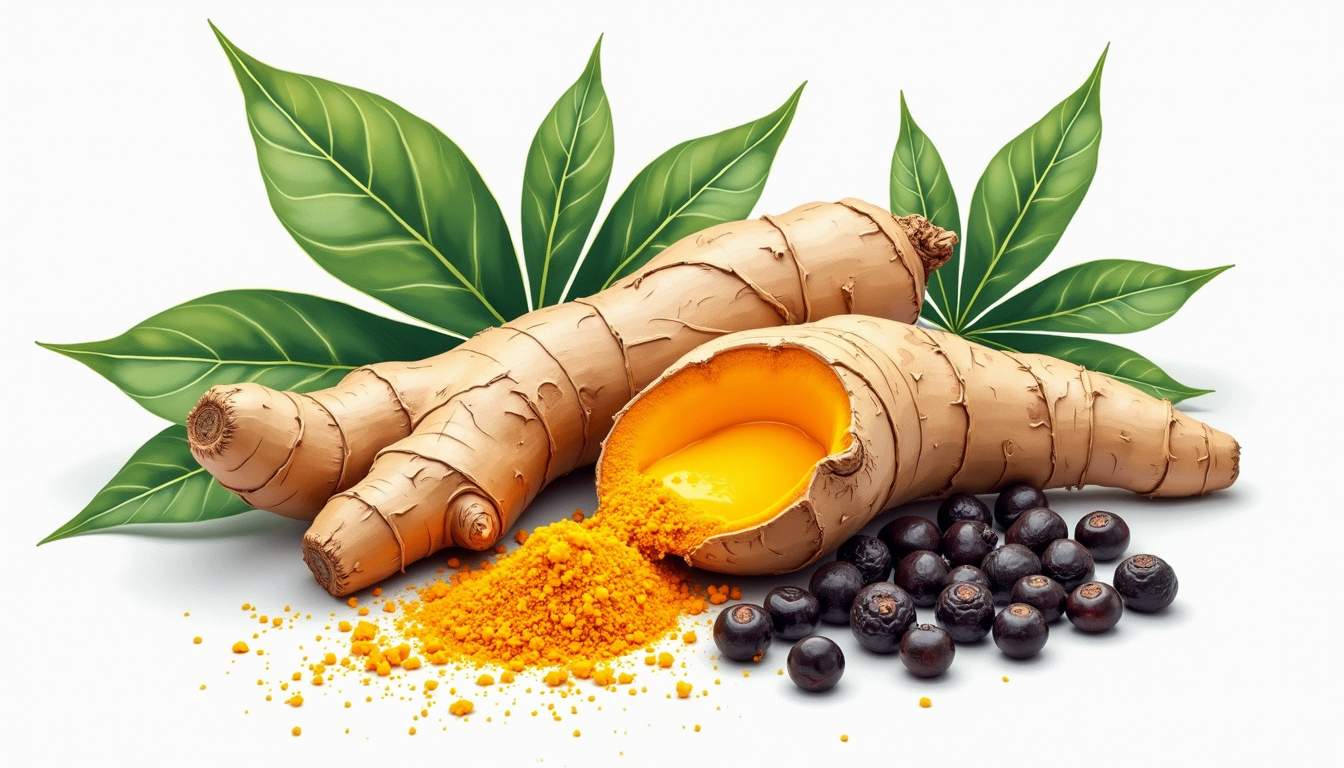Turmeric, ginger, and black pepper each offer powerful health benefits. Turmeric’s curcumin fights inflammation and boosts brain function, ginger aids digestion and eases nausea, while black pepper’s piperine enhances nutrient absorption, especially curcumin. Together, these three spices create a potent combination for reducing inflammation, improving gut health, and supporting overall wellness.
The Powerful Properties of Turmeric
Turmeric, often referred to as the "golden spice," has been a cornerstone of traditional medicine and culinary practices for centuries. Its vibrant yellow color and earthy flavor make it a popular choice in various dishes, but its true value lies in its numerous health benefits. The active compound in turmeric, curcumin, is primarily responsible for its therapeutic properties, making it a subject of extensive scientific research.
Curcumin: Turmeric's Active Compound
Curcumin is a polyphenol that exhibits powerful anti-inflammatory and antioxidant effects. Research has shown that curcumin can help combat chronic inflammation, which is linked to a plethora of health issues, including heart disease, cancer, and neurodegenerative disorders. Its ability to neutralize free radicals and reduce oxidative stress makes it a potent ally in maintaining health.
Moreover, curcumin enhances the body’s natural defense mechanisms. Studies suggest that it may improve brain function by increasing levels of brain-derived neurotrophic factor (BDNF), a protein associated with improved cognitive function and a lower risk of brain diseases. This makes turmeric not only a culinary delight but also a potential cognitive enhancer.
Historical and Cultural Significance of Turmeric
Turmeric has a rich history that spans thousands of years, particularly in South Asia. It has been used in Ayurvedic medicine for its healing properties, often referred to as a remedy for various ailments. In addition to its medicinal uses, turmeric plays a significant role in cultural rituals and ceremonies, symbolizing purity and prosperity.
In many cultures, turmeric is considered a sacred spice, often used in religious ceremonies and as a dye for textiles. Its incorporation into daily diets reflects a deep-rooted belief in its health benefits, showcasing how traditional practices have recognized the value of this remarkable spice long before modern science validated its properties. For instance, in Hindu weddings, turmeric paste is applied to the bride and groom as a symbol of auspiciousness and to bless the union with health and happiness. This ritual underscores turmeric's significance beyond mere flavoring, embedding it deeply into the social fabric of communities.
Furthermore, the cultivation of turmeric itself is steeped in tradition. Farmers often engage in sustainable practices, ensuring that the spice is grown in harmony with the environment. The harvesting process is labor-intensive, typically involving hand-picking the rhizomes, which are then boiled and dried before being ground into the familiar powder. This meticulous approach not only preserves the quality of the spice but also reflects a commitment to maintaining cultural heritage and agricultural biodiversity. As a result, turmeric continues to thrive as a symbol of health and vitality across generations, transcending its culinary use to become a vital part of cultural identity.
Ginger: A Versatile Healing Root
Ginger, another powerhouse in the realm of spices, is renowned for its distinct flavor and numerous health benefits. This aromatic root has been used for centuries in various culinary traditions and is celebrated for its medicinal properties. Its versatility makes it a staple in both sweet and savory dishes, as well as in beverages.

Anti-inflammatory and Digestive Benefits of Ginger
The anti-inflammatory properties of ginger are well-documented, making it an effective remedy for conditions such as arthritis and muscle pain. Gingerol, the primary bioactive compound in ginger, has been shown to reduce inflammation and alleviate pain, providing a natural alternative to over-the-counter pain relievers.
In addition to its anti-inflammatory effects, ginger is widely recognized for its ability to aid digestion. It can help alleviate nausea, particularly in pregnant women and those undergoing chemotherapy. Ginger stimulates the production of digestive enzymes, promoting better nutrient absorption and reducing bloating and discomfort after meals.
Furthermore, ginger has been linked to improved gut health. Studies suggest that it may help balance the gut microbiome by promoting the growth of beneficial bacteria while inhibiting harmful strains. This can lead to enhanced digestive health and overall well-being, making ginger a valuable addition to a balanced diet.
Culinary Applications and Preparation Methods
Ginger's unique flavor profile makes it an incredibly versatile ingredient in the kitchen. It can be used fresh, dried, pickled, or powdered, allowing for a wide range of culinary applications. Fresh ginger can be grated into stir-fries, soups, and marinades, while powdered ginger is often used in baking and spice blends.
One popular preparation method is to brew ginger tea, which not only provides a comforting beverage but also harnesses the root's health benefits. Simply steep fresh ginger slices in hot water, and add honey or lemon for added flavor. This simple yet effective drink can be enjoyed daily to support overall health.
Additionally, ginger can be incorporated into smoothies for a refreshing kick, or used in salad dressings to add a zesty flavor. Pickled ginger, often served with sushi, offers a delightful contrast to rich flavors and aids in digestion. The adaptability of ginger in various cuisines—from Indian curries to Caribbean jerk dishes—showcases its global appeal and the creative possibilities it brings to the table.
Black Pepper: More Than Just a Spice
Black pepper is often referred to as the "king of spices," and for good reason. Its pungent flavor and aroma enhance a variety of dishes, but its health benefits extend far beyond its culinary uses. The active compound in black pepper, piperine, contributes to its medicinal properties and enhances the bioavailability of other nutrients.

Piperine and Its Bioavailability-Enhancing Effects
Piperine is known for its ability to enhance the absorption of various nutrients and compounds in the body, including curcumin from turmeric. Research indicates that piperine can increase the bioavailability of curcumin by up to 2000%, making it a valuable addition to turmeric-based dishes and supplements.
This synergistic effect is particularly important for individuals seeking to maximize the health benefits of turmeric. By combining black pepper with turmeric, one can ensure that the body effectively absorbs and utilizes the beneficial compounds present in these spices, amplifying their overall impact on health.
Combining Black Pepper with Turmeric and Ginger for Maximum Benefits
The combination of turmeric, ginger, and black pepper creates a powerful trio that can enhance overall health and well-being. Together, these spices offer a wide array of benefits, from anti-inflammatory effects to improved digestion and cognitive function. Incorporating all three into daily meals can provide a holistic approach to health.
One way to enjoy this dynamic combination is through a warming spice blend, which can be added to soups, stews, or smoothies. Alternatively, a turmeric-ginger tea with a pinch of black pepper can serve as a soothing drink, perfect for supporting the immune system and promoting relaxation. This tea not only warms the body but also provides a comforting ritual that can help reduce stress and anxiety, making it a perfect addition to your evening routine.
Moreover, the health benefits of black pepper extend to its potential role in weight management. Some studies suggest that piperine may inhibit the formation of new fat cells, thereby aiding in weight loss efforts. This makes black pepper an excellent seasoning choice for those looking to maintain a healthy weight while enjoying flavorful meals. Additionally, the spice's ability to stimulate the digestive enzymes in the stomach can lead to improved digestion, further supporting overall metabolic health.
To experience the combined benefits of turmeric, ginger, and black pepper, try our Turmeric Curcuma Supplement with Black Pepper.

Share:
Biotin Vitamins for Perimenopause Hair Loss
Turmeric Powder Supplement: Benefits, Dosage, and How to Use It for Optimal Health